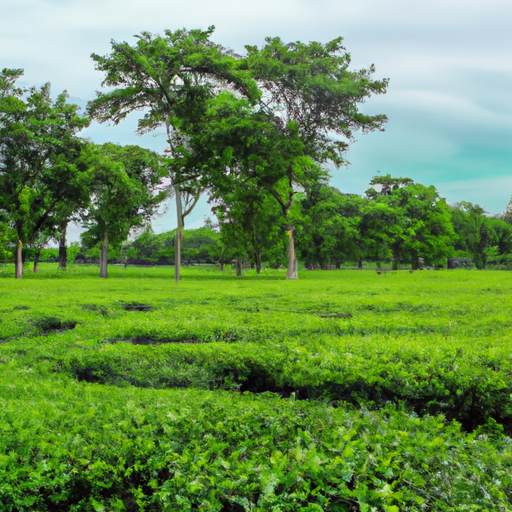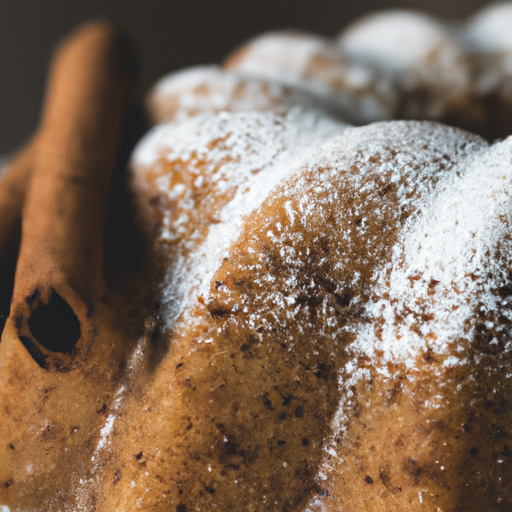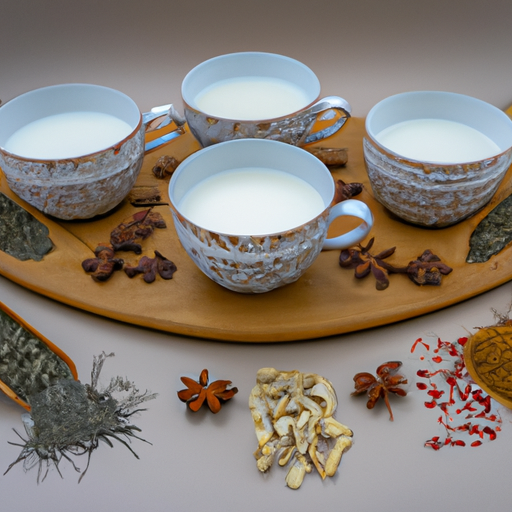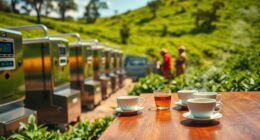Welcome to the captivating land of Assam, where the rich aroma of strong, malty black tea fills the air.
Nestled in the northeastern part of India, Assam is renowned for its tea gardens and the production of exquisite loose leaf teas. As you traverse this enchanting region, the Camellia sinensis var assamica plant, native to these fertile lands, beckons you to experience its wonders.
In the vast tea plantations of Assam, two main types of tea reign supreme: orthodox and CTC. Both offer distinct flavors and characteristics, but it is the robust, full-bodied nature of Assam tea that truly captivates the senses. With its invigorating malty taste, this tea leaves an indelible mark on the palate.
But the allure of Assam tea extends far beyond its delectable flavor. It is believed to possess numerous health benefits, from bolstering the immune system to aiding in weight loss and even providing protection against certain types of cancer. However, it is always wise to seek guidance from a medical professional when incorporating teas or herbs into your wellness routine.
In the art of brewing Assam tea, the key lies in using freshly boiled spring water. Steeped for a mere 2-3 minutes, this elixir reveals its true essence. For those seeking a robust, intense experience, Assam CTC or orange pekoe tea is the preferred choice. Conversely, those desiring a lighter brew with added benefits can indulge in unbroken loose leaf tea.
Embark on a journey to Assam, and let its tea transport you to a realm of unparalleled flavor, health, and wonder. Remember, with every sip, you unlock the essence of this remarkable land, tantalizing your taste buds and soothing your soul.
Key Takeaways
- Assam is known for its tea gardens and production of loose leaf teas, particularly the robust and full-bodied Assam tea made from the Camellia sinensis var assamica plant.
- Assam tea is believed to have health benefits, such as boosting the immune system and aiding in weight loss, due to its catechin content.
- Assam is the largest tea producing region in India, renowned for its high-quality tea production and grading system, with FTGFOP being the highest grade.
- Assam tea can be brewed using various methods, such as adding milk and sugar, making masala chai, cold brewing, using the Gongfu style, or using tea bags, allowing for versatility and experimentation.
Types of Assam Tea
I love the different types of Assam tea, especially the orthodox and CTC varieties, which are known for their full-bodied and malty flavors.
Assam tea is graded based on the size and quality of the leaves. The highest grade is called FTGFOP (Finest Tippy Golden Flowery Orange Pekoe), which consists of young, tender leaves with golden tips. Other grades include TGFOP (Tippy Golden Flowery Orange Pekoe), FOP (Flowery Orange Pekoe), and BOP (Broken Orange Pekoe). These grades determine the quality and taste of the tea.
Assam is the largest tea producing region in India, known for its vast tea gardens and high-quality tea production. The tea plants in Assam thrive in the region’s rich, loamy soil and tropical climate, resulting in the unique flavor profile of Assam tea.
Health Benefits
One surprising perk of enjoying a cup of Assam black tea is its potential to boost the immune system. This robust and malty tea from the land of Assam in India contains natural compounds that can strengthen our body’s defenses against illnesses.
Additionally, Assam tea may also aid in weight loss. It contains catechins, a type of antioxidant that can increase metabolism and promote fat burning. By incorporating Assam tea into a balanced diet and exercise plan, it may help support weight loss efforts.
So, not only does Assam tea deliver a bold and flavorful experience, but it also offers potential health benefits such as boosting the immune system and aiding in weight loss.
Brewing Techniques
To brew a delicious cup of Assam tea, start by using freshly boiled spring water and steeping the leaves for 2-3 minutes. This will ensure that the full flavor and aroma of the tea are extracted.
Here are some alternative brewing methods you can try to enhance your Assam tea experience:
- Cold brew: Steep the tea leaves in cold water overnight for a refreshing and smooth iced tea.
- Milk and sugar: Assam tea pairs exceptionally well with milk and sugar, creating a creamy and indulgent cup.
- Masala chai: Add spices like cardamom, cinnamon, and ginger to create a spiced Assam tea that’s perfect for chilly days.
- Gongfu style: Use a small teapot and multiple short steeps to fully appreciate the complex flavors of Assam tea.
- Assam tea bags: For convenience, choose high-quality Assam tea bags from reputable brands like Taylors of Harrogate or Twinings.
Experiment with these brewing methods and explore different Assam tea brands to find your perfect cup of tea. Enjoy the rich, malty flavors and the comforting warmth of Assam tea.
Frequently Asked Questions
What is the history and cultural significance of Assam black tea in the region?
Assam black tea has a rich history and cultural significance in the region. Its origins can be traced back to the British colonial era, and it has become an integral part of Assamese culture, often served during social gatherings and religious ceremonies.
What are the different grades of Assam black tea and how do they differ?
The different grades of Assam black tea include orthodox and CTC. Orthodox tea has larger, whole leaves and a milder flavor, while CTC tea is smaller and produces a stronger, malty taste. Brewing techniques and steeping times vary for each grade. Both grades offer health benefits and medicinal properties.
Are there any specific varieties or flavors of Assam black tea that are highly sought after?
There are several highly sought-after varieties and flavors of Assam black tea. Some popular ones include Golden Tips, Tippy Golden Flowery Orange Pekoe, and Second Flush. These teas are known for their unique flavors, aroma, and quality.
How does the production process of Assam black tea differ from other types of black tea?
The production process of Assam black tea differs from other types of black tea in the way it is harvested and processed. Unlike other teas, Assam tea is harvested year-round and undergoes a unique fermentation process. Comparison: Assam tea estates employ specific techniques to ensure the distinctive flavor and characteristics of Assam black tea.
Are there any traditional or unique brewing methods specific to Assam black tea?
There are traditional brewing methods and unique preparation techniques specific to Assam black tea. For example, it is recommended to use freshly boiled spring water and steep the tea for 2-3 minutes to extract its full-bodied, malty flavor.
Conclusion
In conclusion, Assam tea isn’t just a beverage, it’s a journey through the beautiful land of strong, malty black tea.
The taste and aroma of Assam tea transport you to the tea gardens of Assam, where every sip tells a story of tradition and craftsmanship.
The health benefits of Assam tea, from boosting the immune system to aiding weight loss, make it a smart choice for those seeking a healthier lifestyle.
So, next time you brew a cup of Assam tea, remember that you’re not just indulging in a delicious drink, but also experiencing the magic of Assam, the land of tea.










